BSc Hons Architectural Studies
ApplyKey facts
- UCAS Code: K100
- Accreditation: Royal Institute of British Architects & Architects Registration Board, LAM/PAM
Study abroad: opportunity to study in Europe, Canada, South East Asia & South America (subject to Visa conditions)
Study with us
Studying a BSc Hons degree in Architectural Studies, you'll be taught in a dynamic studio-based environment by professional practitioners and academics. We focus on engagement with local and international communities encouraging you to balance the practical realities of the world with innovative design.
- focus on the design of buildings, towns and cities and the historical and theoretical ideas that inspire them
- benefit from teaching by our academics and professional architects and engineers
- students regularly win and exhibit work through international and national competitions including Archiprix Intl., AJ Student Prize, RIAS and A+DS, RSA New Contemporaries
- we are one of the highest-scoring architecture departments in the UK for our graduate career prospects (HESA)
- study abroad for one semester and convert your degree title to Architectural Studies with International Study
- validated & recognised by LAM/PAM Lembaga Arkitek Malaysia/Board of Architects Malaysia
Why this course?
Strathclyde’s Department of Architecture is among the oldest and largest such departments in the UK. It's internationally recognised as one of the most socially active schools of architecture in Europe with "projects rooted in real urban concerns" (DOMUS Europe's Top Schools 2014).
Our aim is to produce graduates suitably prepared to meet the architectural demands of the 21st century.
Studying a BSc Hons Architectural Studies degree with us, you'll develop creative design skills, and learn about construction techniques, materials and environment informed by an understanding of architectural history, culture and theory.
You'll be taught to communicate and collaborate in an international studio environment by both academics and professional architects.
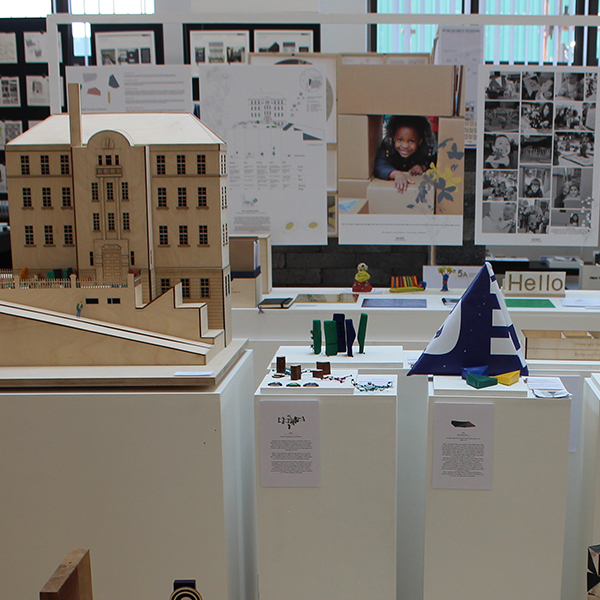

What you'll study
Year 1
Design Studies 1A, 1B, 1C, 1D: The first design studio project will introduce you to the whole of the architectural design process: from conceptualisation and inception, through design development and resolution, to full size realisation and construction. Subsequent projects will develop design methodologies to enable you to design your first building.
Further Year 1 classes are:
- Experiencing Architecture: a compulsory series of discussion seminars and communications skills workshops supporting the Design Studies programme
- Cultural Studies 1: we encourage you to develop confidence in observing and commenting on architecture of all periods, and to express yourself clearly and accurately in spoken and written communication
- Technology Studies 1: this class introduces you to areas such as building structures; construction processes; building physics; and sustainability and environmental responsibility and control
Year 2
Design Studies 2A, 2B, 2C: You'll work on a series of increasingly complex architectural projects set in a Scottish context, which are supported by the Experiencing Architecture 2 programme.
Further Year 2 classes are:
- Cultural Studies 2: you'll be introduced to some of the key issues, historical movements and events that have shaped and structured the modern built and cultural environment. This includes an introduction to the origins of the modern city: from the birth of capitalism to the European avant-garde
- Technology Studies 2: you'll have the chance to expand your knowledge of structural and construction systems and discover more about environmental engineering design skills
- Elective Class: in second-year, you'll choose an elective class from the University Class Catalogue
Year 3
Design Studies 3A, 3B: you'll undertake two projects in a dense urban context, the latter project being an undergraduate thesis.
Further Year 3 classes are:
- Cultural Studies 3: you'll undertake an evaluation of cultural theory and architectural history focusing on issues related to the modern movement in architecture
- Technology Studies 3: the third stage of this programme aims to develop a detailed understanding of structural, construction and environmental systems and an ability to integrate these systems within a complex architectural proposition
- Introduction to Practice: you'll learn about the key features of the architectural profession and the construction industry. You'll complete a digital academic portfolio in line with the requirements of Part 1, ARB/RIBA professional accreditation
Year 4
You'll complete the Design Studies programme with classes 4A and 4B. The Cultural Studies 4 class will assist you in producing your final-year dissertation, working on an area of your own interest. The Special Study Project 4 allows Architectural Studies students to further the aims and outcomes of one of the key areas of the syllabus. This project is intended to link between taught coursework and potential Masters’ projects.
Department of Architecture
Strathclyde's one of the best places you can study architecture - find out why!
The Strathclyde architecture school is really good. The staff are brilliant, really helpful, very inspiring. They get you through and they make it enjoyable.
Lewis Grant, student
Facilities
Studios
We have two design studios; one is a drop-in studio where you can be part of our collaborative and creative studio community, the other is dedicated to design teaching.
Library
In addition to the main University library, we've our own, on-site, reference library. Our collection is developed in direct response to the teaching delivered in the department.
Workshop
A full range of hand and portable power tools are available (complete with instruction).
We offer plotter printing, scanning and laser cutting services.
Find out more about the full range of facilities we have on offer.
Postgraduate study
After graduation there are a number of options for further study.
- The Masters route to ARB/RIBA Part 2 for UK or European students is the MArch in Advanced Architectural Design
- The Masters route for International students seeking RIBA Part 2 exemption is the MArch in Architectural Design (International)
You can also study for:
- MSc/PgDip Urban Design
- MSc/PgDip Architectural Design for the Conservation of Built Heritage
- MSc/PgDip Sustainable Engineering: Architecture & Ecology
- MSc/PgDip/PgCert Advanced Construction Technologies & Building Information Management
Our students
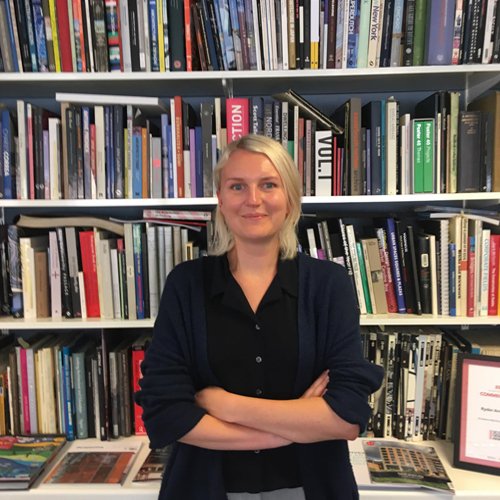
Kristina Enberg
Glasgow is a very active city. I came to visit before I applied and I noticed there was a strong culture of music and art. I felt it was a good place not only for architecture but in terms of all aspects of living here.
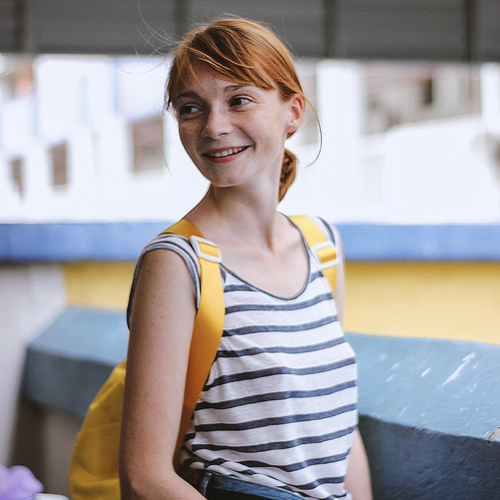
Iga Swiercz
I got the opportunity to be a part of an amazing project team representing Scotland at the Architecture Biennale in Venice; I met extraordinary architects from around the world and at the end I got the chance to have my research and models exhibited across the whole of Scotland in The Happenstance post- biennale exhibition.
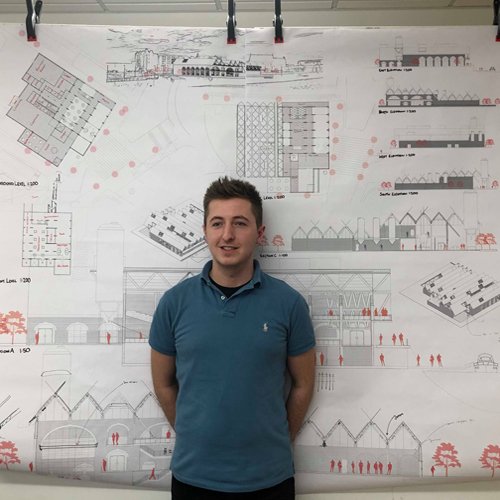
Shawn Kay
One of the good things about coming to Strathclyde is that when you go on your work experience it is already so familiar. Even in the first week of working in practice there are no surprises because you already learnt the design stages. The course sets you up for work experience.
Student competitions
Our students have been successful in winning many national and international competitions, including:
- ARCHIPRIX
- UrbanPromo
- Building Design ‘Top 6’ UK
- RIBA President's Medals
- APS
- the Royal Town Planning Institute
- A+DS
- SEDA
They've also been selected to take part in prestigious International Architecture Biennale.
Find out more about recent awards won by students.
Students are supported in making entries in an extensive annual competition programme:
- the Glasgow Institute of Architects (GIA) recognises the talent of the future profession through awards and commendations across all years of study
- the Scottish Government's Policy on Architecture makes a firm commitment to student awards, jointly provided through the Royal Incorporation of Architects in Scotland (RIAS) and Architecture and Design Scotland (A+DS)
- as with the top national award from the Royal Institute of British Architects, The President's Medals, inclusion in publications and public exhibitions promotes work to a wide audience
- the City of Glasgow Eimear Kelt Silver Medal is awarded annually by a panel of professional judges on behalf of Glasgow City Council, to the best project by a student at the Department of Architecture
Information on entering competitions and links to some award organisations are available on MyPlace in the student section for each year.
Work placement
RIBA/ARB Stage 1 (Part 1) Training
At the end of Year 3, we recommend our students break their academic studies to undertake a year of professional work experience in an architectural practice*. Recent students have found placements in highly-regarded local and international practices in Glasgow, Stornoway, Oslo, Munich, Warsaw, London and Hong Kong.
*Please note the year placement may not be an option for international students on a Tier 4 student visa.
International study
You'll have the opportunity to study abroad during Year 3 or Year 5 (subject to academic performance.) With agreements with 22 institutions across Europe, Canada the Far East and South America, our department has the most expansive international exchange programme in the UK. Students who undertake an exchange in Year 3 convert their degree title to BSc Honours in Architectural Studies with International Study.
Design Studies 1A
To Shelter Part 1
The first architecture design studio project introduces you to the whole of the architectural design process; as a collaborative process, from conceptualisation and inception, through design development and resolution, to full size realisation and construction.
Design Studies 1B
To Shelter Part 2
You'll investigate the fundamental need of man “to shelter”. The project concentrates on the ‘setting’ - the connection of “inside to outside” and the implications of making a mark in the landscape.
Design Studies 1C
To Dwell
You're introduced to the challenges of designing to a brief within the context of the urban environment. The specific issue explored is the nature of domesticity - what it means “to dwell”.
Design Studies 1D
To Settle
You'll engage with real clients in order to develop a programmatic response, delivering a public building in the city.
Experiencing Architecture 1
ARB/RIBA Part 1 (Communication)
The Design Studies programme is supported by a compulsory series of associated discussion sessions and workshops in communication skills and media under the banner experiencing architecture.
Cultural Studies 1
This class introduces you to a broad overview of the cultural context of architecture. You'll be encouraged to develop confidence in observing and commenting on architecture of all periods, and to express yourself clearly and accurately in spoken and written communication.
Technology Studies 1
The class is the first stage of student education regarding the building and environmental technology aspects of architectural design.
The course introduces an elemental understanding of:
- building structures
- construction process
- materiality
- architectural detail
- building physics
- sustainability and environmental responsibility and control
Design Studies 2A
To Belong
You'll investigate what it means ‘to belong’ through a series of small projects taken to develop an understanding of architectural programme in relation to context.
Design Studies 2B
To Gather
You'll investigate what it means “to gather”, understood as a basic human need, to congregate communally in celebration of shared values. You'll be asked to design a medium scaled public facility dedicated to communal activity.
Design Studies 2C
To Learn
The final design project for the second year studio focuses on the programmatic activity of what it means “to learn”. This allows you to examine a single building programme in-depth through a process of analysis and synthesis.
Experiencing Architecture 2
The Design Studies programme is supported by a compulsory series of associated discussion sessions and workshops in communication skills and media under the banner 'Experiencing Architecture'.
Cultural Studies 2
You're introduced to some of the key issues, historical movements and events that shaped and structured the modern built and cultural environment. You'll get an introduction to the origins of the modern city, from the birth of capitalism to the European avant-garde.
Technology Studies 2
This class expands the knowledge base in terms of structural and construction systems introducing:
- more complex building types
- larger spanning structures
- contemporary building materials
- a variety of environmental engineering design skills relating to the design of buildings which will ensure human comfort
Elective Class
You'll take an elective class amounting to 20 credits total from those described in the University Class Catalogue.
For students intending to take the International Exchange programme in Year 3, and to be eligible for the BSc in Architectural Studies with International Study, we recommend 20 credits of language.
Design Studies 3A
To Live/To Work
The class is a semester long investigation into the nature of what it means to live and work in the urban realm through the design of an urban housing project, from feasibility to detailed investigation.
Design Studies 3B
To Play (Undergraduate Thesis)
You'll consider the architectural implications of what it means “to play”, as a collective cultural phenomenon examined against the urban context. The emphasis is on the notion of “performance” and its association to “the city”.
Cultural Studies 3
Technology Studies 3
Introduction to Practice
The class introduces you to the key features of the architectural profession and the construction industry. It provides a forum for discussion on the emerging industry, profession and modes of practice.
You'll complete a digital academic portfolio in line with the requirements of Part 1, ARB/RIBA professional accreditation.
Design Studies 4A
To Care (Part 1)
The class focuses on the design of a small programmatically complex, multi-functional urban building. The design exploration includes site and programme appraisal, the generation and systematic testing, analysing and appraising of design options with the aim of drawing conclusions in the design process.
Design Studies 4B
To Care (Part 2)
The class focuses on the design of a large programmatically simple, multi-functional urban building to be set within a specific urban character. It has to be developed to a detailed level sufficient to demonstrate the relationship between the overall architectural concept, spatial quality and related technical and environmental considerations.
Cultural Studies 4
This class provides you with the opportunity to define, explore and articulate an area of investigation of your own interest in the production of an appropriately illustrated dissertation. You'll develop an argument and demonstrate a position using evidence from your research.
Special Study Project 4
This individual project allows you to further the aims and outcomes of one of the key areas of the syllabus. The project is intended to provide a bridging mechanism between the taught coursework and potential Masters projects.
Learning & teaching
In addition to classes, lectures and seminars, our teaching offers students a wide variety of educational experiences and unique development opportunities. These include:
- Design Studio: design tutorials take place weekly. You'll be taught by our academics and by professional architects and engineers from local practices
- Study trips: recent trips have been made to familiar architectural hotspots, including Barcelona, Rome, Paris and Venice. We have also visited some less familiar sites, such as Gdansk (Poland), Toledo (Spain) and Monte Caruso (Italy)
- Site visits: you'll have the chance to visit architectural sites in both urban and rural areas of Scotland. During these trips you'll examine, record, investigate and research the sites in response to a project brief
- Live build: as an Architectural Studies student you'll explore construction techniques, programme scheduling and material choice through hands-on build projects
- Professional attributes: we help our students develop skills in self-critique, confidence building and independent learning. We invite prominent experts to test students in an external examination interview process
- Transferable skills: these include verbal and visual presentation, group work, research methods, creativity and adaptability
- Clients and consultants: you'll gain skills in communication and networking by engaging with clients and consultants during project work. The clients and consultants include architects, artists, conservation specialists, engineers, urban designers and planners, funders, suppliers and representatives from community groups and local authorities
Assessment
Subject class assignments are based on coursework and for design studies there are both periodic (formative) reviews (student presentations) and final (summative) reviews of students’ project work, including:
- drawings
- models
- photos
- annotated sketches
- notes
- other outputs, individual and group projects
Cultural Studies is examined through both written and graphical assignments.
Technology Studies is examined through an assignment and a written examination.
ARB/RIBA Part 1: Portfolio
The first three years of academic study of the BSc in Architectural Studies, carries with it the professional status of Part 1, ARB/RIBA accreditation/validation. All students are expected to present a complete digital academic portfolio at the end of the academic session.
Guest lectures
Senior students and staff run an exciting programme of guest lectures aligned to department themes and topics allowing students to meet both emerging and established entrepreneurs and professionals. Recent speakers include:
- Joan Callis, Benedetta Tagliabue EMBT, Architects to the Scottish Parliament
- Prof Neil Spiller, Professor of Architecture and Digital Theory, Rachel Armstrong Senior Lecturer in Research and Enterprise, University of Greenwich
- Murray Grigor, Photographer and Film Maker
- Prof Ian Borden, Author and Professor of Architecture, Bartlett, UCL
- Richard Murphy OBE, Architect
- Gordon Benson, Benson and Forsyth. Museum of Scotland, National Museum of Ireland.
- Professor C J Lim, Vice-Dean at The Bartlett Faculty of the Built Environment at University College London. Has 4 RIBA President’s Medals International Teaching Awards.
- Chris McAvoy, Steven Holl Architects, Glasgow School of Art Reid Building
BSc Hons Architectural Studies entry requirements
Entry requirements for our BSc Hons Architectural Studies degree are as follows.
Required subjects are shown in brackets.
| Highers | Standard entry requirements*: AAAB (normally English B, Maths or Physics B, Art & Design/ Graphic Communication/Design & Manufacture B) Minimum entry requirements**: BBBB (English and Maths or Physics). A portfolio may be required if no art-based Higher. |
|---|---|
| A Levels | ABB-BBB (Maths or Physics; GCSE Art & Design or Product Design 6/B, GCSE English Language 6/B or English Literature 6/B) |
| International Baccalaureate | 34-32 (English HL5 and Maths HL5 or Physics HL5) |
| HNC/HND | HND Architectural Technology; Interior Design; CAAD or 3D Design with AA Graded Units |
| International students | View the entry requirements for your country. |
| Deferred entry | Accepted |
| English language requirements | If English is not your first language, please visit our English language requirements page for full details of the requirements in place before making your application. |
Additional information
- candidates likely to fulfil the entry requirements and who do not have an art/design qualification may be asked to submit a portfolio which should contain examples of a range of work providing evidence to indicate creative and artistic ability
- SQA Higher Applications of Mathematics is not accepted instead of Higher Mathematics
- both IB Higher Level Mathematics pathways are accepted
*Standard entry requirements
Offers are made in accordance with specified entry requirements although admission to undergraduate programmes is considered on a competitive basis and entry requirements stated are normally the minimum level required for entry.
Whilst offers are made primarily on the basis of an applicant meeting or exceeding the stated entry criteria, admission to the University is granted on the basis of merit, and the potential to succeed. As such, a range of information is considered in determining suitability.
In exceptional cases, where an applicant does not meet the competitive entry standard, evidence may be sought in the personal statement or reference to account for performance which was affected by exceptional circumstances, and which in the view of the judgement of the selector would give confidence that the applicant is capable of completing the programme of study successfully.
**Minimum entry requirements
Contextual Admissions for Widening Access
We want to increase opportunities for people from every background.
Strathclyde selects our students based on merit, potential, and the ability to benefit from the education we offer. We look for more than just your grades. We consider the circumstances of your education and will make lower offers to certain applicants as a result.
University preparation programme for international students
We offer international students (non-UK/Ireland) who do not meet the academic entry requirements for an undergraduate degree at Strathclyde the option of completing an Undergraduate Foundation Programme in Business and Social Sciences at the University of Strathclyde International Study Centre.
Upon successful completion, you can progress to your chosen degree at the University of Strathclyde.
International students
We've a thriving international community with students coming here to study from over 100 countries across the world. Find out all you need to know about studying in Glasgow at Strathclyde and hear from students about their experiences.

Fees & funding
All fees quoted are for full-time courses and per academic year unless stated otherwise.
Fees may be subject to updates to maintain accuracy. Tuition fees will be notified in your offer letter.
All fees are in £ sterling, unless otherwise stated, and may be subject to revision.
Annual revision of fees
Students on programmes of study of more than one year (or studying standalone modules) should be aware that the majority of fees will increase annually. The University will take a range of factors into account, including, but not limited to, UK inflation, changes in delivery costs and changes in Scottish and/or UK Government funding. Changes in fees will be published on the University website in October each year for the following year of study and any annual increase will be capped at a maximum of 10% per year.
| Scotland | £1,820 Scottish undergraduate students undertaking an exchange for a semester/year will continue to pay their normal tuition fees at Strathclyde and will not be charged fees by the overseas institution. |
|---|---|
| England, Wales & Northern Ireland | £9,535 |
| Republic of Ireland |
If you are an Irish citizen and have been ordinary resident in the Republic of Ireland for the three years prior to the relevant date, and will be coming to Scotland for Educational purposes only, you will meet the criteria of England, Wales & Northern Ireland fee status. For more information and advice on tuition fee status, you can visit the UKCISA - International student advice and guidance - Scotland: fee status webpage. Find out more about the University of Strathclyde's fee assessments process. |
| International | £25,550 |
| Placement year | To be confirmed. |
| Additional costs | Course materials & costsBooks and printed materials
Placement & field tripsStudy trips
Other costsDrawing materials
Model making
Miscellaneous costs (for example, photocopying)
International studentsInternational students may have associated visa and immigration costs. Please see student visa guidance for more information. |
| Available scholarships | Take a look at our scholarships search for funding opportunities. |
Please note: All fees shown are annual and may be subject to an increase each year. Find out more about fees.
How can I fund my studies?
Students from Scotland
Fees for students who meet the relevant residence requirements in Scotland, you may be able to apply to the Student Award Agency Scotland (SAAS) to have your tuition fees paid by the Scottish government. Scottish students may also be eligible for a bursary and loan to help cover living costs while at University.
For more information on funding your studies have a look at our University Funding page.
Students from England, Wales & Northern Ireland
We have a generous package of bursaries on offer for students from England, Northern Ireland and Wales:
You don’t need to make a separate application for these. When your place is confirmed at Strathclyde, we’ll assess your eligibility. Take a look at our scholarships search for funding opportunities.
International Students
We have a number of scholarships available to international students. Take a look at our scholarship search to find out more.
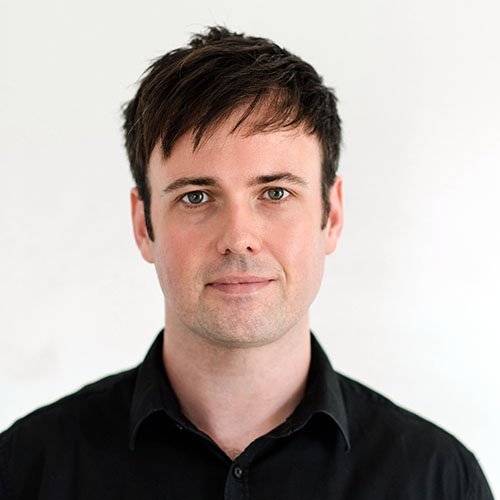
I enjoyed the variety of subjects covered in the course, which was a mix of technical and creative classes. This broad range allows people to find their own interests and areas of study.
Architecture graduate and 2019 AJ Architecture Awards winner
Careers
Career opportunities for Architectural Studies graduates range from working in large multidisciplinary practices to smaller specialist firms.
Many of our graduates are employed by highly respected practices throughout the world, while others have set up their own businesses.
The broad-based nature of our degree programme has allowed many recent graduates to explore varied career options in for example web design, architectural model making, theatre set design and in computer games, film and music industries. Graduates have also undertaken research roles in the energy and low carbon industries.
Our department also has a growing reputation for developing entrepreneurial graduates, who go on to make their mark in the sector independently. Practices such as:
- Page and Park
- Nord
- Collective
- Dress for the Weather
- Tog Studio
- Lateral North
Glasgow is Scotland's biggest & most cosmopolitan city
Our campus is based right in the very heart of Glasgow. We're in the city centre, next to the Merchant City, both of which are great locations for sightseeing, shopping and socialising alongside your studies.
Apply
Start date:
Architectural Studies (1 year entry)
Start date:
Architectural Studies (1 year entry)
Start date: Sep 2025
Architectural Studies (1 year entry)
Start date:
Architectural Studies (1 year entry)

